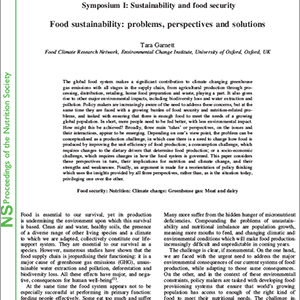
A new FCRN article – “Food sustainability: problems, perspectives and solutions” – has been published in the journal Proceedings of the Nutrition Society.
Abstract
The global food system makes a significant contribution to climate changing greenhouse gas emissions with all stages in the supply chain, from agricultural production through processing, distribution, retailing, home food preparation and waste, playing a part. It also gives rise to other major environmental impacts, including biodiversity loss and water extraction and pollution. Policy makers are increasingly aware of the need to address these concerns, but at the same time they are faced with a growing burden of food security and nutrition-related problems, and tasked with ensuring that there is enough food to meet the needs of a growing global population. In short, more people need to be fed better, with less environmental impact. How might this be achieved? Broadly, three main ‘takes’ or perspectives, on the issues and their interactions, appear to be emerging. Depending on one's view point, the problem can be conceptualised as a production challenge, in which case there is a need to change how food is produced by improving the unit efficiency of food production; a consumption challenge, which requires changes to the dietary drivers that determine food production; or a socio-economic challenge, which requires changes in how the food system is governed. This paper considers these perspectives in turn, their implications for nutrition and climate change, and their strengths and weaknesses. Finally, an argument is made for a reorientation of policy thinking which uses the insights provided by all three perspectives, rather than, as is the situation today, privileging one over the other.
The article can also be accessed via the Journal website (subscription only) here.



Post a new comment »